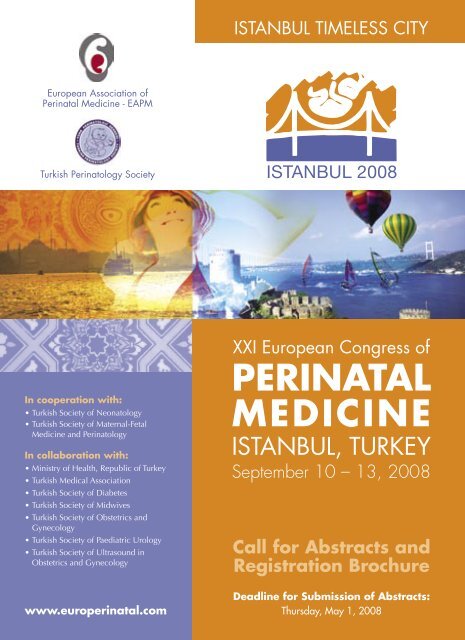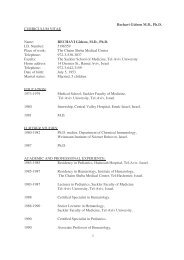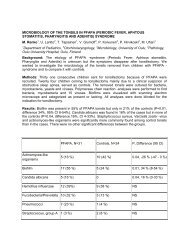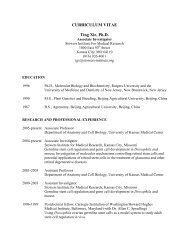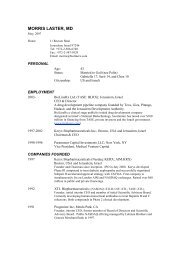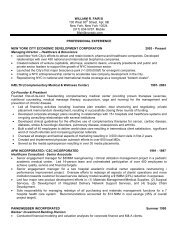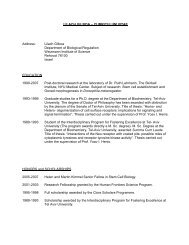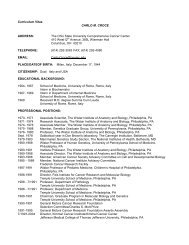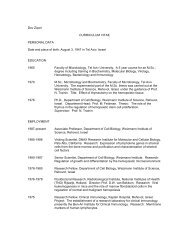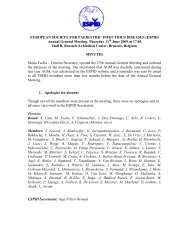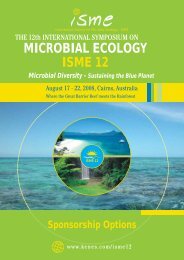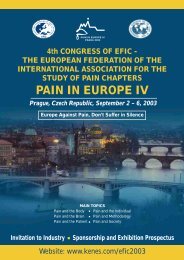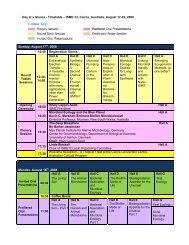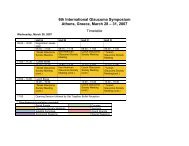PERINATAL MEDICINE
PERINATAL MEDICINE
PERINATAL MEDICINE
You also want an ePaper? Increase the reach of your titles
YUMPU automatically turns print PDFs into web optimized ePapers that Google loves.
European Association of<br />
Perinatal Medicine - EAPM<br />
Turkish Perinatology Society<br />
In cooperation with:<br />
• Turkish Society of Neonatology<br />
• Turkish Society of Maternal-Fetal<br />
Medicine and Perinatology<br />
In collaboration with:<br />
• Ministry of Health, Republic of Turkey<br />
• Turkish Medical Association<br />
• Turkish Society of Diabetes<br />
• Turkish Society of Midwives<br />
• Turkish Society of Obstetrics and<br />
Gynecology<br />
• Turkish Society of Paediatric Urology<br />
• Turkish Society of Ultrasound in<br />
Obstetrics and Gynecology<br />
www.europerinatal.com<br />
ISTANBUL TIMELESS CITY<br />
XXI European Congress of<br />
<strong>PERINATAL</strong><br />
<strong>MEDICINE</strong><br />
ISTANBUL, TURKEY<br />
September 10 – 13, 2008<br />
Call for Abstracts and<br />
Registration Brochure<br />
Deadline for Submission of Abstracts:<br />
Thursday, May 1, 2008<br />
www.europerinatal.com 1
CONTENTS<br />
XXI EUROPEAN CONGRESS OF <strong>PERINATAL</strong> <strong>MEDICINE</strong><br />
Welcome from Congress President 3<br />
Welcome from EAPM President 4<br />
Committees 5<br />
About EAPM 6<br />
Preliminary Timetable 8<br />
Preliminary List of Speakers and Chairpersons 9<br />
Preliminary Programme 10<br />
Call for Abstracts 17<br />
Abstract Topics 18<br />
General Information 19<br />
Registration Fees and Social Events 20<br />
Accommodation 22<br />
2 CALL FOR ABSTRACTS AND REGISTRATION BROCHURE
Dear Colleagues,<br />
ISTANBUL, TURKEY, SEPTEMBER 10 – 13, 2008<br />
On behalf of the European Association of Perinatal Medicine<br />
and the Turkish Perinatology Society, it is a great pleasure<br />
to welcome you to Istanbul-Turkey for the occasion of the<br />
XXI European Congress of Perinatal Medicine.<br />
We are convinced that our scientific potential, combined with the professional<br />
facilities and infrastructure as well as the well-known Turkish hospitality and<br />
organisation talents, make Istanbul the cultural and economical centre in<br />
the region one of the best sites in Europe. Istanbul is an ideal location for a<br />
memorable congress of the European Association of Perinatal Medicine in the<br />
year 2008. As a country, Turkey and as a city, Istanbul bridges two continents. In<br />
this sense the European Congress of Perinatal Medicine in Istanbul may serve as<br />
an ideal scientific platform to exchange the scientific information and challenge<br />
between scientists and clinicians from the different countries.<br />
The congress centre, located in the modern business district of Harbiye has<br />
been renovated as Turkey’s largest congress centre. There is a wide range<br />
of accommodation in Istanbul, and all the major international hotels are<br />
represented, along with a large number of capable and highly professional<br />
organisers. Each hotel offers a rich blend of service and sophistication and is<br />
well equipped to meet the needs of visitor. Guests are welcomed and cared<br />
for in the grand and gracious traditions of hospitality that have made Istanbul<br />
famous for centuries. Genuine warmth and generosity are characteristic of the<br />
hospitality extended, since Turkish tradition declares that every traveller is a<br />
guest of God.<br />
A very large list of topics in perinatal medicine has been prepared for the<br />
congress. With keynote lectures and papers from different part of Europe and<br />
other countries, we are sure that you are going to have very friendly discussions,<br />
exchange ideas and share all your scientific work with others who are interested<br />
in perinatal medicine. Authors of some submitted abstracts will be offered the<br />
opportunity to present their important scientific work together with invited<br />
speakers as free communications in main sessions. These scientific papers will<br />
be selected by the Scientific Committee and the first author of the paper will<br />
be notified before the congress. There will also be poster viewing sessions and<br />
poster discussion sessions in the programme.<br />
We are looking forward to seeing you in Istanbul.<br />
Let’s meet for perinatal medicine where the continents meet in a timeless city,<br />
Istanbul!<br />
Yours sincerely,<br />
Prof. Cihat Şen<br />
Congress President, ECPM-2008<br />
President-Elect, EAPM<br />
www.europerinatal.com<br />
3
XXI EUROPEAN CONGRESS OF <strong>PERINATAL</strong> <strong>MEDICINE</strong><br />
EAPM PRESIDENT’S LETTER OF WELCOME<br />
It is my great pleasure to welcome you to the 21 st European<br />
Congress of Perinatal Medicine being held in Istanbul, Turkey<br />
from 10th to 13th October 2008. We have a full and varied<br />
scientific programme which we hope will be of interest to all<br />
our delegates.<br />
My thanks are due to Cihat Sen, the Congress President, Umberto Simeoni<br />
and his Scientific Committee and Kenes International for putting this excellent<br />
programme together in this beautiful city of Istanbul. Just as Istanbul is a bridge<br />
between 2 continents, the European Association of Perinatal Medicine should<br />
be a bridge between the 2 major disciplines of perinatal medicine – obstetrics<br />
(maternal fetal medicine) and paediatrics (neonatology). We also welcome<br />
our colleagues from other allied disciplines: perinatal pathology, genetics,<br />
epidemiology, midwifery, neonatal nursing, obstetric anaesthesia, paediatric<br />
surgery and all other subspecialties and hope that they benefit from the<br />
interdisciplinary sessions. This Congress we have tried to include sessions on<br />
Hot Topics and have asked leading speakers from around the world to help us<br />
set these up. You will learn more about the Cochrane Collaboration and hear<br />
the results of recent important clinical trials in Perinatal Medicine.<br />
We must not forget the major challenges that remain for those of us working in<br />
perinatal medicine. Perhaps the greatest of these is the provision of evidencebased<br />
healthcare to mothers and babies in the developing world. This needs<br />
both the expertise of doctors and nurses but also political and governmental<br />
support. We must continue to lobby for this support and ensure that closer to<br />
home our endeavours match up to the highest levels of scientific integrity when<br />
scrutinised by others. The European Association of Perinatal Medicine, which<br />
means its members, must strive to raise and maintain its profile and standing<br />
throughout the scientific world. These challenges are not insurmountable but<br />
will require determined and focussed effort from all quarters.<br />
I hope you have a very pleasant visit to Istanbul enjoying both the quality of the<br />
scientific programme and the beauty and excitement of this fascinating city.<br />
Henry L Halliday<br />
President of EAPM<br />
4 CALL FOR ABSTRACTS AND REGISTRATION BROCHURE
COMMITTEES<br />
ISTANBUL, TURKEY, SEPTEMBER 10 – 13, 2008<br />
European Congress of Perinatal Medicine<br />
Committee 2008<br />
Congress President: Cihat S ̧en Congress Secretary: Nilgün Kültürsay<br />
European Association<br />
of Perinatal Medicine<br />
OFFICERS 2006 - 2008<br />
EXECUTIVE BOARD<br />
President Henry Halliday<br />
President Elect Cihat S ̧en<br />
Past President Aris Antsaklis<br />
Secretary Yves Ville<br />
Treasurer Grzegorz Breborowicz<br />
Members Moshe Hod<br />
The Hung Bui<br />
Peter Zoban<br />
Marietta Xanthou<br />
Executive Director Gian Carlo Di Renzo<br />
COMMITTEES<br />
Scientific Committee<br />
Umberto Simeoni – Chairman<br />
Apostolos Athanassiadis<br />
Fabio Facchinetti<br />
Malcom Levene<br />
Anton Mikhailov<br />
Jan Nijhuis<br />
Adolf Vall y Soler<br />
Christian Speer<br />
Florin Stamatian<br />
Marta Szymankiewicz<br />
Educational Committee<br />
Gian Carlo Di Renzo – Chairman<br />
Krissa Bakoula<br />
Kubilay Ertan<br />
Zdenek Hajek<br />
Dominique Haumont<br />
Asim Kurjak<br />
Kypros Nicolaides<br />
Nebojsa Radunovic<br />
Aydin Tekay<br />
Murat Yayla<br />
Turkish Society<br />
of Perinatal Medicine<br />
EXECUTIVE BOARD<br />
President Turgay Şener<br />
President Elect Ayse Kafkaslı<br />
Past President Cihat Şen<br />
Secretary Özgür Deren<br />
Treasurer Murat Yayla<br />
Members Yeşim Baytur<br />
Ali Ergün<br />
Riza Madazlı<br />
Lütfü Önderoğlu<br />
COMMITTEES<br />
Local Scientific Committee<br />
Turgay Sener – Chairman<br />
Arif Akşit<br />
Saadet Arsan<br />
Sinan Beksaç<br />
Nur Danişmend<br />
Cansun Demir<br />
Hasan ilkova<br />
Oktay Kadayifçi<br />
Eren Özek<br />
Vildan Ocak<br />
Semih Özeren<br />
Yildiz Perk<br />
Yunus Söylet<br />
Gülsevin Tekinalp<br />
Bülent Tıraş<br />
Temel Yilmaz<br />
Seyfettin Uludağ<br />
Murat Yurdakök<br />
Atıl Yüksel<br />
Social Committee<br />
Ercüment Cengiz – Chairman<br />
Bahar Gökşin<br />
Figen Şen<br />
www.europerinatal.com<br />
5
ABOUT EAPM<br />
XXI EUROPEAN CONGRESS OF <strong>PERINATAL</strong> <strong>MEDICINE</strong><br />
Extract from ‘Subspecialization in Perinatal Medicine’.<br />
Full text available at www.europerinatal.com<br />
Subspecialization in Perinatal Medicine<br />
The management of high risk pregnancies and fetal<br />
pathology is a frequent problem and antenatal<br />
diagnosis increasingly requires a multidisciplinary<br />
approach. In some cases, it will require the<br />
involvement of an individual who has had special<br />
training in feto-maternal and neo-natal physiology and<br />
pathology as well as genetics, embryology, fetal and<br />
maternal screening and diagnostic procedures and<br />
perinatal care and counselling. EBCOG notes with<br />
approval the development of subspecialty practices in<br />
a number of countries and considers that feto-maternal<br />
medicine should be recognised as a subspecialty, in<br />
Europe. Educational objectives and requirements for<br />
training in these subspecialist areas have been defined<br />
in conjunction with acknowledged experts from the<br />
European Association of Perinatal Medicine (EAPM) and<br />
are defined in the syllabus. The role of a subspecialist is<br />
complementary to, and not in competition with, that of<br />
the specialist in Obstetrics and Gynaecology.<br />
Training of the Feto-Maternal Medicine<br />
subspecialist:<br />
1. Definition: The Feto-Maternal and Perinatal<br />
Subspecialist is a specialist in Obstetrics and<br />
Gynaecology who has had a theoretical and<br />
practical training in:<br />
a. detailed risk assessment before during and after<br />
pregnancy;<br />
b. ante-natal diagnosis of the wide range of<br />
materno-fetal disorders, some of which may<br />
require an invasive procedure;<br />
c. management of very high risks pregnancies<br />
during the ante-natal , intra-partum , and post<br />
partum period.<br />
The practice of feto-maternal and perinatal medicine<br />
excludes the subspecialist from training and practice<br />
in another subspecialty<br />
5. The means of training<br />
5.1 Entry requirements: a recognised specialist<br />
qualification in Obstetrics and Gynaecology or have<br />
completed a minimum of five years in an approved<br />
training programme in Obstetrics and Gynaecology,<br />
the availability of a recognised training post<br />
5.2 For each country, the estimated number of training<br />
posts should reflect the national need for subspecialists<br />
in feto-maternal and perinatal medicine, as well as the<br />
facilities and finance available for training<br />
6 CALL FOR ABSTRACTS AND REGISTRATION BROCHURE<br />
5.3 Arrangements for postgraduate training must be<br />
compatible with national employment and teaching<br />
legislation in relation to remuneration, hours of work<br />
and rights of employees in such matters as sick leave,<br />
maternal and paternal leave and compulsory military<br />
service.<br />
5.4 The duration of subspecialty training should<br />
include a minimum of two years in an approved<br />
programme and should cover the clinical and research<br />
aspects of the following areas: Ultrasound and other<br />
imaging procedures –Genetics–Neonatology - Maternal<br />
and Fetal Surveillance in high risk pregnancies - Basic<br />
Science e.g. maternal and fetal physiology, histopathology<br />
and embryology - Counselling.<br />
5.5 Training should be structured throughout with<br />
clearly defined targets<br />
5.6 A trainee may spend some training time in<br />
another (1 or 2) centre(s) recognised by<br />
EAPM, after approved by the appropriate national<br />
committee.<br />
6. Assessment of training<br />
6.1 In all European countries, approval of training and<br />
trainers should be the responsibility of a national or<br />
regional authority which has the power to withdraw<br />
recognition, if necessary.<br />
6.2 Approval of a training centre should be based on:<br />
annual statistics - internal quality control and audit -<br />
organised teaching sessions - availability of a clinical<br />
genetics unit, intensive neonatal care unit, neonatal<br />
surgical unit, adult intensive care unit, designated<br />
place for caring for severely ill women, perinatal<br />
pathologist, multi-disciplinary team regularly involved<br />
in the management of high risk pregnancies, fulfilment<br />
of defined criteria for minimum activity for each trainee<br />
per year: 200 supervised high risk pregnancies and<br />
deliveries - 200 advanced ultrasound examinations -<br />
200 fetal invasive procedures (amniocentesis, chorion<br />
villus sampling, fetal blood sampling).<br />
6.3 Assessment of the trainee should be carried out by<br />
a national or federal committee of experts and should<br />
take into consideration: participation in Feto-Maternal<br />
Medicine courses, in particular those recognised<br />
by EBCOG, advised by the European Association of<br />
Perinatal medicine ( EAPM), completion of a Log Book<br />
of clinical experience in Feto-Maternal Medicine,<br />
peer review publications in a nationally recognised<br />
journal.<br />
6.4 A representative from the EBCOG may be an<br />
observer on the national or federal assessment<br />
committee.<br />
6.5 EAPM in conjunction with EBCOG organises an<br />
evaluation visit to a subspecialist unit, if requested.<br />
ECPM President, Prof. Cihat Sen<br />
Rumeli cad 19/7 Nisantaşı, Istanbul – 34301, Turkey. Email: csen@europerinatal.com
EAPM<br />
EUROPEAN<br />
ASSOCIATION<br />
OF <strong>PERINATAL</strong><br />
<strong>MEDICINE</strong><br />
The European Association of Perinatal Medicine (EAPM)<br />
is bringing together groups and individuals in order to<br />
promote the science of perinatal medicine for the benefit<br />
of a high level of physical and mental health for women,<br />
mothers and their children in Europe. Your EAPM<br />
membership could involve you in different disciplines in<br />
perinatal care as well as meet colleagues from European<br />
countries.<br />
Want to become a member?<br />
Please visit our site for more information<br />
www.europerinatal.com<br />
EAPM Administrative Office<br />
c/o Kenes International<br />
1-3 Rue de Chantepoulet, P.O.Box 1726, CH-1211 Geneva 1, Switzerland<br />
Tel: +41 22 908 04 82, Fax: +41 22 732 26 07, www.europerinatal.com<br />
7
XXI EUROPEAN CONGRESS OF <strong>PERINATAL</strong> <strong>MEDICINE</strong><br />
PRELIMINARY TIMETABLE<br />
WEDNESDAY, SEPTEMBER, 10, 2008<br />
10.00 - 17.00 Pre-Congress Courses (see page 10)<br />
17.30 - 18.30 Opening Lectures<br />
18.00 - 20.00 Opening Ceremony<br />
20.00 - 22.30 Welcome Reception<br />
THURSDAY, SEPTEMBER 11, 2008<br />
09.00 - 10.30 Plenary Lectures<br />
11.00 - 12.30 Symposia<br />
12.30 - 14.30 Lunch Break<br />
14.30 - 16.15 Parallel Sessions<br />
16.45 - 18.30 Parallel Sessions<br />
FRIDAY, SEPTEMBER 12, 2008<br />
09.00 - 10.30 Plenary Lectures<br />
11.00 - 12.30 Symposia<br />
12.30 - 14.30 Lunch Break<br />
14.30 - 16.15 Parallel Sessions<br />
16.45 - 18.30 Parallel Sessions<br />
20.00 GALA DINNER<br />
SATURDAY, SEPTEMBER 13, 2008<br />
09.00 - 10.30 Plenary Lectures<br />
11.00 - 12.30 Symposia<br />
12.30 - 14.30 Lunch Break<br />
14.30 - 16.15 Parallel Sessions<br />
16.45 - 18.30 Parallel Sessions<br />
8 CALL FOR ABSTRACTS AND REGISTRATION BROCHURE
ISTANBUL, TURKEY, SEPTEMBER 10 – 13, 2008<br />
PRELIMINARY LIST OF SPEAKERS<br />
AND CHAIRPERSONS<br />
R. Achiron, Israel<br />
A. Adra, Lebanon<br />
Z. Alfirevic, UK<br />
A. Akşit, Turkey<br />
JV Anker, USA<br />
A. Antsaklis, Greece<br />
S. Arsan, Turkey<br />
S. Arulkumaran, UK<br />
A. Athanassiadis, Greece<br />
B. Arenas, Spain<br />
A. Baschat, USA<br />
i. Başer, Turkey<br />
Y. Baytur, Turkey<br />
S. Beksac, Turkey<br />
G. Bevilacqua, Italy<br />
G. Breborowicz, Poland<br />
A. Brice, France<br />
T.H. Bui, Sweden<br />
L. Cabero-Roura, Spain<br />
X. Carbonell, Spain<br />
V. Carnielli, Italy<br />
M. Carrapato, Portugal<br />
J.M. Carrera, Spain<br />
J. Carvalho, UK<br />
A. Çelenk, Turkey<br />
F.A. Chervenak, USA<br />
G. Clerici, Italy<br />
V. D’Addario, Italy<br />
N. Danişment, Turkey<br />
G. Daskalakis, Greece<br />
N. Demir, Turkey<br />
J. Deprest, Belgium<br />
Ö. Deren, Turkey<br />
G.C. Di Renzo, Italy<br />
G.P. Donzelli, Italy<br />
T. Duan, China<br />
J. Dudenhausen, Germany<br />
W. Dunlop, UK<br />
S. Eiknes, Norway<br />
A. Ergün, Turkey<br />
R. Erkkola, Finland<br />
K. Ertan, Germany<br />
M. Evans, USA<br />
F. Facchinetti, Italy<br />
Z. Fatusic, Bosnia & Herzegovina<br />
R. Frazer, UK<br />
M. Gallo, Spain<br />
U. Gembruch, Germany<br />
L. Gortner, Germany<br />
E. Gratacos, Spain<br />
A. Greenough, UK<br />
J. Jenkins, UK<br />
D. Jurkovic, UK<br />
H. Hagberg, Denmark<br />
Z. Hajek, Czech Republic<br />
H. Halliday, UK<br />
D. Haumont, Belgium<br />
K. Hecher, Germany<br />
M. Hod, Israel<br />
W. Holzgreve, Switzerland<br />
P. Husslein, Austria<br />
M. Ivanisevic, Croatia<br />
O. Kadayıfçı, Turkey<br />
A. Kafkaslı, Turkey<br />
Ö. Kandemir, Turkey<br />
H. Karlberg, Sweden<br />
K. Khan, UK<br />
O. Kilavuz, Germany<br />
Y. Kimya, Turkey<br />
A. Koç, Turkey<br />
E. Koç, Turkey<br />
K. Kuczkowski, USA<br />
N. Kültürsay, Turkey<br />
M. Künhert, Germany<br />
A. Kurjak, Croatia<br />
R. Laurini, Norway<br />
C. Lees, UK<br />
N. Marlow, UK<br />
D. Maulik, USA<br />
I. Meizner, Israel<br />
A. Mikhailov, Russia<br />
N. Modi, UK<br />
M. Momtaz, Egypt<br />
G. Monni, Italy<br />
NT. Neto, Portugal<br />
K. Nicolaides, UK<br />
G. Nigro, Italy<br />
J. Nijhuis, The Netherlands<br />
Z. Novak Antolic, Slovenia<br />
V. Ocak, Turkey<br />
C. O’Herlihy, Ireland<br />
N. Oygür, Turkey<br />
L. Önderog¨lu, Turkey<br />
E. Özek, Turkey<br />
D. Paladini, Italy<br />
N. Papadogiannakis, Sweden<br />
A. Papageorghiou, UK<br />
N. Papantoniou, Greece<br />
A. Papitashvilli, Georgia<br />
Y. Perk, Turkey<br />
R. Pooh, Japan<br />
A. Puertas, Spain<br />
R. Quintero, USA<br />
N. Radunovic, Serbia<br />
G. Rizzo, Italy<br />
R. Romero, USA<br />
E. Saliba, France<br />
E. Saling, Germany<br />
O. Saugstad, Norway<br />
K.T.M. Schneider, Germany<br />
M. Schimmel, Israel<br />
T. Şener, Turkey<br />
B. Serra, Spain<br />
U. Simeoni, France<br />
R. Soll, USA<br />
Y. Söylet, Turkey<br />
C. Speer, Germany<br />
M. Stanojevic, Croatia<br />
P. Steer, UK<br />
T. Stefos, Greece<br />
F. Stamatian, Romania<br />
M. Szymankiewicz, Poland<br />
A. Tabor, Denmark<br />
R.C. Tasker, UK<br />
A. Tekay, Finland<br />
B. Thilaganathan, UK<br />
I. Timor-Trisch, USA<br />
A. Thachenko, Ukraine<br />
J. Troyano, Spain<br />
S. Ural, USA<br />
A. Ugwumadu, UK<br />
A. Vals y Soler, Spain<br />
D. Vaiman, France<br />
E. Vergahen, The Netherlands<br />
Y. Ville, France<br />
G. Visser, The Netherlands<br />
R. Vladareanu, Romania<br />
A. Wahed, Jordan<br />
J. Wladimiroff, The Netherlands<br />
M. Xanthou, Greece<br />
M. Yayla, Turkey<br />
M. Yurdakök, Turkey<br />
A. Yüksel, Turkey<br />
Y. Zalel, Israel<br />
P. Zoban, Czech Republic<br />
www.europerinatal.com<br />
9
XXI EUROPEAN CONGRESS OF <strong>PERINATAL</strong> <strong>MEDICINE</strong><br />
PRELIMINARY PROGRAMME<br />
PRE-CONGRESS COURSES - WEDNESDAY, SEPTEMBER 10, 2008<br />
Registration to courses is limited and pre-registration is required. Please see<br />
pages 20 and 21 for further information.<br />
Morning Courses (10:00 – 13:00)<br />
Course 1: Advanced Ultrasound – FMF Course<br />
• Genetics: Epidemiology and fetal diagnosis<br />
• Fetal Heart: Routine and targeted<br />
• 11-14 weeks: Anatomy and screening<br />
• Screening of Preterm Delivery<br />
• Screening of pre-eclampsia<br />
• IUGR: Prediction and Management<br />
Course 2: Intrapartum Management<br />
• Template for the definition of intrapartum hypoxia<br />
• The role of fetal blood sampling and acid base balance<br />
• Fetal ECG waveform analysis in intrapartum fetal monitoring<br />
• The role of fetal pulse-oximetry<br />
• Special situations such as pyrexia, meconium, oxytocin infusion<br />
• Monitoring the fetus at risk in labour (e.g. IUGR, Preterm labour, Diabetic<br />
mother)<br />
• Medico-legal considerations<br />
• Anesthesia-analgesia in labour<br />
Course 3: Delivery room resuscitation: Evidence-based approach<br />
• Delivery room resuscitation - past - present - future<br />
• Hypo-hypertermia in delivery room<br />
• Non-initiation and discontinuation of resuscitation<br />
• Treatment of hypotension-drugs and/or volume resuscitation<br />
• Drugs in neonatal resuscitation<br />
• MSAF- how to approach?<br />
• Laringeal masks and CPAP in resuscitation<br />
Course 4: Neonatal brain disorders - early diagnostic and therapeutic<br />
approach<br />
• Intrauterine infections and developing brain<br />
• Neuroprotection from asphyxia: Drugs, hypothermia<br />
• Cranial ultrasound - the role and limitations<br />
• Cerebral function monitors<br />
• New neuroimaging techniques<br />
• Neurological follow-up<br />
10 CALL FOR ABSTRACTS AND REGISTRATION BROCHURE
ISTANBUL, TURKEY, SEPTEMBER 10 – 13, 2008<br />
Afternoon Courses (14:00 – 17:00)<br />
Course 5: Fetal Cardiology<br />
• Fetal echo doppler for early detection of congenital heart block<br />
• Which fetal anomaly is indication for pregnancy termination and which is<br />
not?<br />
• Meaning of four chamber view?<br />
• Great vessels are easy to show up?<br />
• What is routine heart examination for Obstetricians?<br />
• AVSD? VSD?<br />
• Asymmetry of ventricles in the heart<br />
• Antenatal diagnosis of coarctation: role of new imaging techniques<br />
• Heart anomaly and chromosomal anomalies<br />
Course 6: Surfactant use and mechanical ventilation: new approaches<br />
• Surfactant use in neonate<br />
• CPAP and non-invasive ventilation<br />
• Volume targeted and volume guarantee ventilation<br />
• Pressure support ventilation<br />
• Real time pulmonary graphics<br />
• High frequency ventilation - evidence based recommendations<br />
• Weaning strategies, failure to extubate<br />
Course 7: Neonatal emergencies<br />
• Antenatal and intrapartum diagnosis of asphyxia<br />
• Postnatal management of asphyctic infant<br />
• Metabolic emergencies<br />
• Diagnosis and management of neonatal seizures<br />
• Management of cyanotic baby<br />
• Management of renal failure<br />
• The bleeding neonate<br />
PLENARY LECTURES<br />
Plenary Lectures I<br />
• Prematurity Prevention - an update<br />
• The role of progesterone in pregnancy maintenance<br />
• Prenatal infections and consequences for the newborn<br />
Plenary Lectures II<br />
• Outcome for disadvantaged first-time mothers: The Moment Study<br />
• Can ultrasound change the behaviour of the doctors in labor ward?<br />
• Are low birth weight infants at increased risk for cardio-vascular and<br />
metabolic diseases in adulthood? What we know and don't know<br />
Plenary Lectures III<br />
• Rapid aneuploidy diagnosis in prenatal diagnosis<br />
• Why the Groningen protocol should not be implemented by perinatologists<br />
• Prediction of Pre-eclampsia: First Trimester Screening<br />
www.europerinatal.com<br />
11
XXI EUROPEAN CONGRESS OF <strong>PERINATAL</strong> <strong>MEDICINE</strong><br />
PRELIMINARY PROGRAMME (cont.)<br />
SYMPOSIA<br />
Intrapartum Management<br />
• ECG waveform analysis in labour - where are we today<br />
• CTG and medico-legal issues<br />
• Oxygen administration for the preterm infant in the delivery room and beyond<br />
• Anesthesia-analgesia in labour<br />
• Induction of labour and its consequences<br />
Cerebral Palsy<br />
• Antenatal contribution: Infectious diseases in pregnancy and cerebral palsy<br />
• Intrapartum contribution of the STAN study<br />
• Genetic contribution<br />
• Antenatal contribution<br />
• Intrapartum contribution<br />
• Neonatal contribution<br />
Perinatal Infections<br />
• Infectious diseases in perinatal medicine<br />
• Maternal viral infections and the newborn<br />
• Chorioamnionitis: Fetal and neonatal consequences?<br />
• Infections and threatened abortion-labour<br />
PARALLEL SESSIONS<br />
All Parallel Sessions will include invited presentations and 3 free<br />
communications chosen from the submitted abstracts.<br />
Maternal morbidity and mortality<br />
• Maternal mortality in the world: the real challenge<br />
• HAPO Study - Hyperglycemia and adverse pregnancy outcome<br />
• Gestational thyroid disease; when to start treatment<br />
• Obstetric anaesthesia and perinatal medicine: is there a missing link?<br />
Fetal mortality and morbidity<br />
• Placenta and stillbirths<br />
• Microdeletion syndromes: An overview<br />
• Heavy metals and neural tube defects<br />
• Daily iatrogenic teratology: drugs, alcohol, smoking…<br />
• Neonatal clinical pharmacology: the science investigating the interface<br />
between development and pharmacogenetics<br />
Prematurity<br />
• Prevention of preterm delivery: Is it routinely available to everyone?<br />
• Management of acute preterm labour<br />
• 17 hydroxy progesterone after a successful acute tocolysis<br />
• New markers in detection of inflammation in PPROM<br />
12 CALL FOR ABSTRACTS AND REGISTRATION BROCHURE
ISTANBUL, TURKEY, SEPTEMBER 10 – 13, 2008<br />
IUGR<br />
• Management of IUGR: TRUFFLE results<br />
• Hypertensive and normotensive IUGR and ultrasound Doppler<br />
• Diagnosis and management of IUGR<br />
• Acute problems of IUGR neonate<br />
• Epigenetical alteration in the IUGR placenta<br />
Multiple Pregnancies (1)<br />
• Fetal reduction and late termination of pregnancy: How far should we go?<br />
• Hot topics on multiple pregnancies<br />
• Twin pregnancy: The choice of optimal route of delivery<br />
• Placental examination in multiples<br />
Multiple Pregnancies (2)<br />
• Laser therapy in TTTS and TRAP<br />
• Diagnosis and therapy of TTTS<br />
• Management of severe IUGR in one monochorionic twin<br />
Pre-eclampsia<br />
• Placental functional pathology in pre-eclampsia<br />
• The pathophysiology of trophoblast invasion in causing pre-eclampsia<br />
• Proteomics for prediction of pre-eclampsia<br />
• Maternal mortality and morbidity in pre-eclamptic women<br />
• Anesthesia and analgesia in pre-eclamptic women<br />
What is new in perinatal genetics (1)<br />
• New insights into modern prenatal genetics<br />
• Proteomics and genomics<br />
• Diagnosis of fetal disorders from maternal blood<br />
What is new in perinatal genetics (2)<br />
• Confined placental mosaicism and intrauterine growth restriction<br />
• Maternal microchimerism in human pregnancy<br />
• Microdeletion syndromes: An overview<br />
Perinatal Cardiology<br />
• What is routine ultrasound examination for fetal heart<br />
• Fetal ECHO in first trimester<br />
• Fetal ECO in second trimester<br />
• 4D fetal echocardiography in the study of structural and functional cardiac<br />
diseases<br />
Do we practice evidence-based medicine?<br />
• The Cochrane Reviews and actual Obstetric practice<br />
• The Cochrane Reviews and actual Neonatal practice<br />
Fetal anomalies (1)<br />
• Prenatal and postnatal diagnostic aids: US, CT, MRI, biopsies etc.<br />
• Prenatal Imaging (US and MRI) and cerebral development<br />
• Up-to-date Fetal Neuroimaging<br />
www.europerinatal.com<br />
13
XXI EUROPEAN CONGRESS OF <strong>PERINATAL</strong> <strong>MEDICINE</strong><br />
PRELIMINARY PROGRAMME (cont.)<br />
Fetal anomalies (2)<br />
• Postnatal Neurological Prognosis of CNS Abnormalities with Accurate<br />
Prenatal Detection<br />
• Fetoscopic surgery: an update<br />
• Fetal obstructive uropathy: is urine or amniotic fluid sampling useful for<br />
prenatal counselling?<br />
Down Syndrome (1)<br />
• Social aspects<br />
• Fetal malformations during NT screening<br />
• What is optimal screening method for Down<br />
• The effect of introducing first trimester combined screening for Down’s<br />
syndrome at a national level<br />
Down Syndrome (2)<br />
• NT, NB, DV, and TR: How applicable and effective?<br />
• An essential dimension of risk assessment and invasive genetic diagnosis<br />
• CVS and amniocentesis - what are the real risks?<br />
Caesarean section<br />
• Trial of labor after caesarean section<br />
• Caesarean section on demand and consequences<br />
• Breech delivery and C/S<br />
Maternal and neonatal problems (1)<br />
• Thromboembolic diseases in pregnancy, intra- and post partum<br />
• Neonatal problems in antiphopholipid syndrome<br />
• Antiphospholipid Syndrome<br />
• Thromboembolic problems in neonate<br />
Maternal and neonatal problems (2)<br />
• Hypothyroidism in pregnancy<br />
• Management of postpartum haemorrhage<br />
• Surgical treatment of post-partum haemorrhage<br />
Perinatal problems in infertility cases (1)<br />
• Induction protocols and perinatal consequences<br />
• Infertility drugs and prevalence of genetic disorders<br />
• ART technologies and prevalence of genetic disorders<br />
Perinatal problems in infertility cases (2)<br />
• Counseling of infertility cases for pregnancy outcome<br />
• ART and PGD: Impact on the fetus and neonate<br />
ELBW (1)<br />
• Neurological and cognitive development of ELBW infants<br />
• Delivery room management and transport to NICU<br />
• Prevention and treatment of NEC<br />
14 CALL FOR ABSTRACTS AND REGISTRATION BROCHURE
ISTANBUL, TURKEY, SEPTEMBER 10 – 13, 2008<br />
ELBW (2)<br />
• Increasing birth rate of ELBW infants and impact on their long-term outcome:<br />
Czech national data<br />
• Soft care in NICU – How can we take care of them less invasively and less<br />
disturbingly?<br />
• EuroNeoStat: an information system to monitor outcomes in VLBW infants<br />
End of life decision (1)<br />
• NIDCAP and end of life decisions<br />
• When a newborn is bound to die<br />
• The Groningen protocol: how and why<br />
End of life decision (2)<br />
• Perinatal care in extremely preterm age<br />
• Dilemmas regarding decision-making in newborn at the limits of viability (22-<br />
23 weeks)<br />
• Ethics and epidemiologic data at the threshold of viability<br />
Ethics<br />
• Ethics in neonatal medicine<br />
• No newborn should ever die alone<br />
• End of life decision-making in newborns: How far should we go?<br />
• Equilibrium between maternal and fetal rights<br />
• Fetal reduction and late termination of pregnancy. How far should we go?<br />
Workshop<br />
• A declaration concerning maternal and fetal rights<br />
Neonatal Brain (1)<br />
• Is 3D ultrasound useful in the diagnostic of neonatal brain?<br />
• Prevention or repair of brain damage<br />
• IVH-PVL: are they preventable?<br />
• Brain injury in near-term infants<br />
Neonatal Brain (2)<br />
• Maternal infections and prematurity<br />
• Development of innate immune system<br />
• Diagnosis of bacterial infection in neonate<br />
• Guidelines for selection of antibacterial therapy<br />
• Infection control and surveillance in NICU<br />
Neonatal RDS and Surfactant (1)<br />
• Pulmonary surfactant pharmacokinetics<br />
• Surfactant therapy: Prophylaxis vs. rescue<br />
• Surfactant treatment in RDS<br />
Neonatal RDS and Surfactant (2)<br />
• Genetic disorders of surfactant structure and function<br />
• New therapeutic applications of surfactant<br />
• Conventional versus new ventilatory strategies in RDS patients?<br />
www.europerinatal.com<br />
15
XXI EUROPEAN CONGRESS OF <strong>PERINATAL</strong> <strong>MEDICINE</strong><br />
PRELIMINARY PROGRAMME (cont.)<br />
Neonatal RDS and Surfactant (3)<br />
• Single or repeat antenatal steroids<br />
• CPAP and RDS Epicure Study<br />
• New concepts about bronchopulmonary dysplasia<br />
Neonatal RDS and Surfactant (4)<br />
• Iatrogenic events and quality improvement programmes in neonatal care<br />
• RDS in near term infants<br />
• Impact of antenatal and postnatal results/interventions on respiratory outcome<br />
Neonatal cardiac problems<br />
• Arythmias and abnormal heart rate<br />
• How to suspect and diagnose a cardiac baby in delivery room and NICU?<br />
• Stabilization and invasive cardiac procedures in neonate<br />
• Patent ductus arteriosus in preterm infant<br />
• Blood pressure problems: Hypo-hypertension<br />
Nutrition of preterm infant (1)<br />
• Early aggressive parenteral nutrition<br />
• Early aggressive enteral nutrition<br />
• Immunonutrition in neonate<br />
• Postdischarge nutrition<br />
Nutrition of preterm infant (2)<br />
• Promotion of breastfeeding in NICU<br />
• Catch-up or not to catch-up?<br />
• Early origins of adult diseases<br />
Screening Tests - European Experience (1)<br />
• Metabolic screening tests-today and tomorrow<br />
• How to suspect and diagnose a baby with metabolic disorders?<br />
Screening Tests - European Experience (2)<br />
• Hearing tests<br />
• Developmental hip dysplasia<br />
• Different strategies in screening hypotiroidism<br />
Neonatal Infections (1)<br />
• Immunological/inflammatory mechanisms in neonates<br />
• Diagnosis of bacterial infection in neonate<br />
Neonatal Infections (2)<br />
• Guidelines for selection of antibacterial therapy<br />
• Infection control and surveillance in NICU<br />
16 CALL FOR ABSTRACTS AND REGISTRATION BROCHURE
ISTANBUL, TURKEY, SEPTEMBER 10 – 13, 2008<br />
CALL FOR ABSTRACTS<br />
Deadline for the submission of abstracts: Thursday, May 1, 2008<br />
Participants who would like to present an oral or poster presentation must submit<br />
an abstract for consideration by the Scientific Committee. The abstracts should be<br />
submitted in English and arrive no later than Thursday, May 1, 2008.<br />
The Scientific Committee will determine whether abstracts will be accepted<br />
as oral or poster presentations, with consideration to be given to the author’s<br />
preference. Authors of some submitted abstracts will be offered the opportunity<br />
to present their important scientific work together with invited speakers as free<br />
communications in main sessions. These scientific papers will be selected by<br />
the Scientific Committee and the first author of the paper will be notified before<br />
the congress. There will also be poster viewing sessions and poster discussion<br />
sessions in the programme.<br />
Highest scoring oral presentation will be included in the main session together<br />
with invited speakers<br />
The presenting author is required to ensure that all co-authors are aware of the<br />
content of the abstract before submission to the Secretariat.<br />
Only the abstracts of registered presenting authors will be included in the program<br />
and book of abstracts.<br />
Abstracts accepted for presentation will be published on the website prior to the<br />
Conference.<br />
SUBMISSION<br />
Abstracts should be submitted only via the congress website:<br />
http://www.kenes.com/ecpm/call.asp (Please do not make multiple submissions of<br />
the same abstract). Full instructions for submission can be found at the website.<br />
If you do not have access to the internet please contact the Conference<br />
Secretariat.<br />
Abstracts submitted by fax will not be accepted.<br />
PREPARATION OF PRESENTATIONS<br />
Instructions for preparation of posters will be sent together<br />
with the acceptance notification.<br />
The Congress program will include a poster discussion session.<br />
The Committee will select a limited number of posters to be<br />
discussed in these sessions.<br />
ABSTRACT BOOK<br />
Abstracts will be published as a supplement to the Journal<br />
of Maternal-Fetal and Neonatal Medicine.<br />
www.europerinatal.com<br />
17
XXI EUROPEAN CONGRESS OF <strong>PERINATAL</strong> <strong>MEDICINE</strong><br />
18 CALL FOR ABSTRACTS AND REGISTRATION BROCHURE<br />
ABSTRACT TOPICS<br />
A. MATERNAL OUTCOME<br />
B. FETAL OUTCOME<br />
C. NEONATAL OUTCOME<br />
D. <strong>PERINATAL</strong> CARE<br />
E. PATHOLOGY<br />
F. GENETICS<br />
G. HEALTH CARE<br />
H. EPIDEMIOLOGY<br />
I. INFECTIOUS DISEASES<br />
J. TEACHING AND TRAINING<br />
K. SCREENING<br />
L. FETAL CARDIOLOGY<br />
M. ULTRASOUND<br />
N. IUGR<br />
O. PREECLAMPSIA<br />
P. FETAL ANOMALIES<br />
Q. INFERTILITY<br />
R. ETHICS<br />
S. PRETERM LABOR
ISTANBUL, TURKEY, SEPTEMBER 10 – 13, 2008<br />
GENERAL INFORMATION<br />
Congress Venue:<br />
Istanbul Convention and Exhibition Centre<br />
Harbiye 34267, Istanbul, Turkey<br />
Tel: +90 212 296 30 55, Fax: +90 212 224 08 78<br />
Language<br />
The official language of the Congress will be English.<br />
ISTANBUL<br />
The splendid city of Istanbul has many unique and fascinating features. It is a city where<br />
phrase “East meets West” really applies, reaching across two continents, with its old city in<br />
Europe and modern Istanbul situated in Asia, separated by the Bosphorus Strait.<br />
The charm and character of Istanbul lies in its endless variety and jumble of contradictions.<br />
Its fascinating history has left the city an inheritance of splendid palaces, ancient mosques<br />
and churches, hamams (bath-houses) and exotic bazaars. Modern Istanbul has presented<br />
trendy bars and nightclubs, western boutiques, office blocks, and elegant suburbs. The call<br />
to prayer starts each day and the city comes to life with over 11 million residents forming<br />
a chaotic social and cultural mix.<br />
Climate<br />
September is the beginning of autumn in Istanbul and the weather is at its best, as it begins to<br />
cool after a hot summer. Average temperatures vary between 16ºC – 25ºC (61ºF – 77ºF).<br />
ECPM Congress Secretariat<br />
1-3 rue de Chantepoulet, P.O. Box 1726<br />
CH-1211 Geneva 1, Switzerland<br />
Tel: +41 22 908 0488 ext. 275, Fax: +41 22 732 2850<br />
E-mail: ecpm@kenes.com, Website: www.europerinatal.com<br />
Sponsorship and Exhibition<br />
A commercial and technical exhibition will be organized within the framework of<br />
this congress. For more information on exhibiting and on sponsorship options please<br />
visit the congress website or contact Ms Yael Almog-Manor at Kenes International<br />
(address as above).<br />
Email: yalmog@kenes.com<br />
Tel: +41 22 908 0488 ext 967<br />
www.europerinatal.com<br />
19
XXI EUROPEAN CONGRESS OF <strong>PERINATAL</strong> <strong>MEDICINE</strong><br />
REGISTRATION FEES AND SOCIAL EVENTS<br />
Fees apply to payments received prior to the deadlines<br />
REGISTRATION<br />
Early Bird<br />
Up to and including<br />
June 24, 2008<br />
20 CALL FOR ABSTRACTS AND REGISTRATION BROCHURE<br />
Regular From<br />
June 25 to September 3, 2008<br />
On site From<br />
September 4, 2008<br />
Full Participants € 540 € 580 € 640<br />
Local Participants € 200 € 250 € 300<br />
Nurses* € 250 € 250 € 250<br />
Participants from<br />
developing countries**<br />
€ 250 € 250 € 250<br />
Pre-Congress Courses €50 €50 €50<br />
Accompanying Persons € 225 € 225 € 225<br />
Gala Dinner € 70<br />
Additional guest ticket to<br />
the Welcome Reception<br />
€ 35<br />
* In order to obtain the special fee for nurses, an approval letter signed by the head of the<br />
department must accompany the registration form (if registered via the website please fax<br />
approval marked to the attention of ECPM 2008)<br />
** Developing countries are defined according to the World Bank Country Classification.<br />
For more information see the Country Classification data at the World Bank website<br />
– www.worldbank.org<br />
Fees for Congress Participants include:<br />
• Participation in all scientific sessions<br />
Please note: Pre-congress courses require separate registration<br />
• Printed material of the Congress<br />
• An invitation to the Welcome Reception<br />
• Lunch on Thursday, September 11 – Saturday, September 13<br />
• Entrance to the exhibition<br />
Fees for Accompanying Persons include:<br />
• Invitation to the Congress Welcome Reception<br />
• 2 half day tours – for further details please see the congress website at<br />
www.kenes.com/ecpm<br />
Delegates paying full congress registration fees will receive membership of the European<br />
Association of Perinatal Medicine for the year 2009, including a one-year on-line<br />
subscription to The Journal of Maternal-Fetal & Neonatal Medicine.<br />
CANCELLATION POLICY<br />
Faxed, emailed or post-marked:<br />
• Cancellation received until June 10, 2008 – full refund will be made less €50 bank charges<br />
• Cancellation received from June 11 – July 24, 2008 – cancellation charge of 50% will be<br />
made<br />
• Cancellation received from July 25 – no refund given
OFFICIAL SOCIAL EVENTS<br />
ISTANBUL, TURKEY, SEPTEMBER 10 – 13, 2008<br />
Date Time Event Price<br />
Wednesday, September 10, 2008 18:00<br />
Welcome<br />
Reception<br />
included in registration<br />
fees*<br />
Saturday, September 13, 2008 20:00 Gala Dinner € 70<br />
*Additional guest tickets can be purchased for €35<br />
PRE-CONGRESS COURSES<br />
Registration to pre-congress courses is limited and subject to a €50 charge per course.<br />
Please note: these courses are run in two parallel sessions. Please chose only 1 course from<br />
each session.<br />
10:00 – 13:00<br />
COURSE 1:<br />
Advanced<br />
Ultrasound– FMF<br />
Course<br />
13:00 – 14:00 LUNCH BREAK<br />
14:00 – 17:00 COURSE 5:<br />
Fetal Cardiology<br />
COURSE 2:<br />
Intrapartum<br />
Management<br />
COURSE 6:<br />
Surfactant use<br />
and mechanical<br />
ventilation: new<br />
approaches<br />
COURSE 3:<br />
Delivery room<br />
resuscitation:<br />
Evidence based<br />
approach<br />
COURSE 7:<br />
Neonatal emergencies<br />
PAYMENT<br />
Payment of Registration Fees should be made in Euro by the following methods:<br />
• By Credit Card: i.e. Visa, MasterCard, Diners Club or American Express*<br />
*Payments made with American Express will be charged in U.S. Dollars<br />
according to the exchange rate at the day of the transaction<br />
• Cheque: payable to the “ECPM 2008”<br />
• Bank Transfer: Please make drafts payable to:<br />
• Account Name: ““ECPM 2008”<br />
Bank details: Credit Suisse Geneva, 1211 Geneva 70, Switzerland.<br />
Bank Code: 4835<br />
Swift No: CRESCHZZ12A<br />
Account Number: 693980-52-114<br />
IBAN No: CH98 0483 5069 3980 5211 4<br />
COURSE 4:<br />
Neonatal brain<br />
disorders- early<br />
diagnostic and<br />
therapeutic<br />
approach<br />
* Bank charges are the responsibility of the participant and should be paid at source in<br />
addition to the registration and accommodation fees.<br />
* Please make sure the name of the congress and the participant are stated on the bank<br />
transfer.<br />
GROUP REGISTRATION<br />
For group registration (10 participants and up) please contact the group registration department<br />
at: ecpm_reg@kenes.com<br />
www.europerinatal.com<br />
21
XXI EUROPEAN CONGRESS OF <strong>PERINATAL</strong> <strong>MEDICINE</strong><br />
ACCOMMODATION<br />
1-3 rue de Chantepoulet, CH-1211 Geneva 1, Switzerland<br />
Tel: +41 22 908 0488, Fax: +41 22 732 2850<br />
E-mail:ecpm_reg@kenes.com<br />
Kenes International is the official organiser of the “ECPM 2008” congress and will be<br />
offering special reduced rates for the congress participants at the following hotels:<br />
Hotel Category Single Room Double Room Distance from Venue<br />
Hilton<br />
Garden View rooms<br />
Hilton<br />
Bosphoros View rooms<br />
22 CALL FOR ABSTRACTS AND REGISTRATION BROCHURE<br />
€250 €270 2 minutes walk<br />
€310 €335 2 minutes walk<br />
Hyatt €250 €270 5 minutes walk<br />
Elite World €230 €250 8 minutes walk<br />
Hilton ParkSA<br />
Plus rooms<br />
Hilton ParkSA<br />
Guest rooms<br />
€270 €290 10 minutes walk<br />
€230 €250 10 minutes walk<br />
Grand Oztanik €145 €170 5 minutes walk<br />
Konak Hotel €115 €135 5 minutes walk<br />
Elite Hotel €140 €170 8 minutes walk<br />
Rates are shown per room, per night and include breakfast and all taxes<br />
How to Book<br />
In order to benefit from the special congress rates, please send the Registration &<br />
Accommodation form with the required deposit (1 night charge) by fax or mail at your<br />
earliest convenience.<br />
On-line reservations for Accommodation will be available via the congress website<br />
www.kenes.com/ecpm shortly.<br />
We strongly advise all participants to reserve their hotel accommodation as soon as<br />
possible. Kenes International will not be able to guarantee rooms after August 10, 2008.<br />
Each participant will receive an individual confirmation, indicating the name and<br />
address of the hotel. Hotel reservations will be confirmed only after receiving a deposit<br />
of one night’s room charge payable by credit card, cheque or bank transfer.<br />
If hotel reservation is made by a sponsoring company, the participant will receive the<br />
corresponding hotel confirmation directly from the sponsoring company.<br />
For group bookings (10 rooms and more) companies are requested to send their request<br />
by fax or e-mail to Kenes International at ecpm_reg@kenes.com. Different payment<br />
and cancellation policies will apply.
ISTANBUL, TURKEY, SEPTEMBER 10 – 13, 2008<br />
Payment<br />
Payment of accommodation fees should be made in Euro by the following methods:<br />
• By Credit Card: i.e. Visa, MasterCard, Diners Club or American Express*<br />
*Payments made with American Express will be charged in U.S. Dollars<br />
according to the exchange rate at the day of the transaction<br />
• Cheque: payable to the “ECPM 2008”<br />
• Bank Transfer: Please make drafts payable to:<br />
• Account Name: ““ECPM 2008”<br />
Bank details: Credit Suisse Geneva, 1211 Geneva 70, Switzerland.<br />
Bank Code: 4835<br />
Swift No: CRESCHZZ12A<br />
Account Number: 693980-52-114<br />
IBAN No: CH98 0483 5069 3980 5211 4<br />
* Bank charges are the responsibility of the participant and should be paid at<br />
source in addition to the registration and accommodation fess.<br />
* Please make sure the name of the conference and the participant are stated on<br />
the bank transfer.<br />
Please note that 3 weeks prior to arrival, your credit card will be automatically charged<br />
for the balance of your hotel accommodation. Participants who paid their deposit<br />
by bank transfer or cheque are required to send the balance of the accommodation<br />
charge to “ECPM 2008” Secretariat at Kenes International, 21 days before arrival.<br />
Cancellation of Accommodation<br />
• Cancellations or changes must be received in writing to Kenes International (by<br />
fax or e-mail).<br />
• Cancellations/changes received 21 days prior to arrival – full refund less €50<br />
bank charges<br />
• Cancellation/changes received between 20-10 days prior to arrival – 1 night fee<br />
will be charged.<br />
• Cancellation/changes received less than 10 days prior to arrival – no refund will<br />
be made.<br />
In the event of non-arrival, the hotel will automatically release the reservation, and full<br />
payment will be non-refundable.<br />
Late arrival /Early Departure Fee<br />
If you arrive later or leave earlier than on the dates of your confirmed booking, the total<br />
accommodation amount will be charged and no refunds will be made<br />
Important Notes<br />
Kenes International and their agents shall not be responsible for and shall be exempt<br />
from all liability in respect of any loss, damage, injury, accident, delay or inconvenience<br />
to any person, or his /her luggage or any other property for any reason whatsoever, for<br />
any tourist services provided. Personal travel and health insurance is recommended.<br />
www.europerinatal.com<br />
23
XXI EUROPEAN CONGRESS OF <strong>PERINATAL</strong> <strong>MEDICINE</strong><br />
08 ISTANBUL<br />
24 CALL FOR ABSTRACTS AND REGISTRATION BROCHURE


